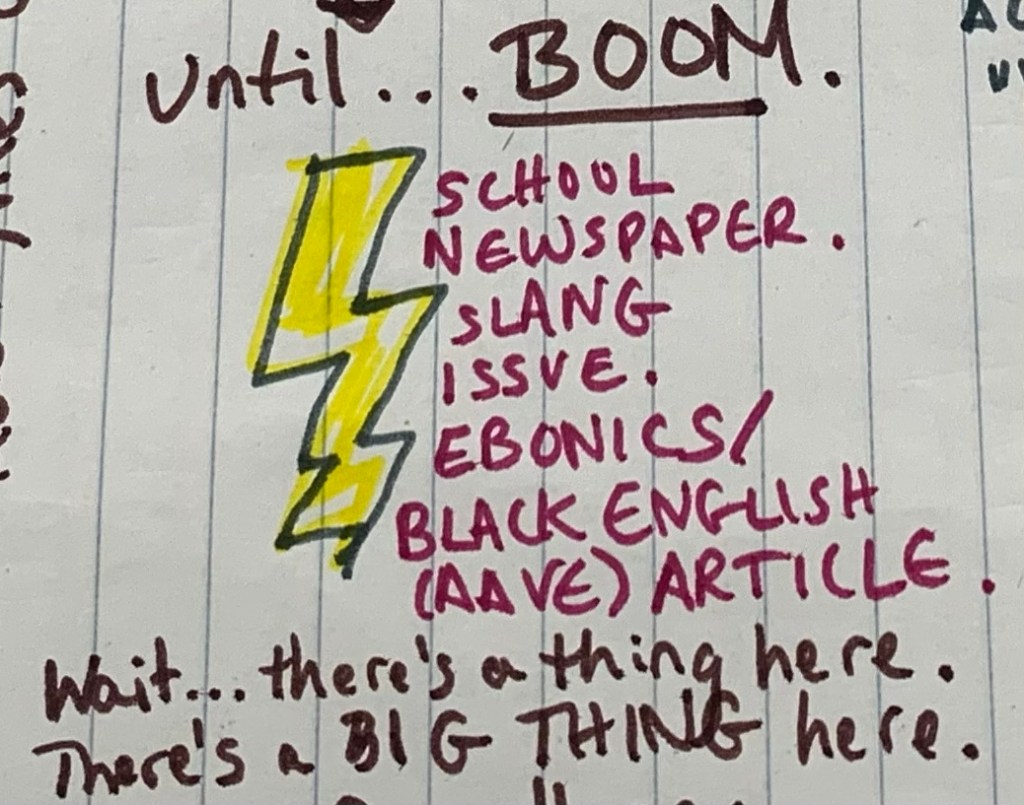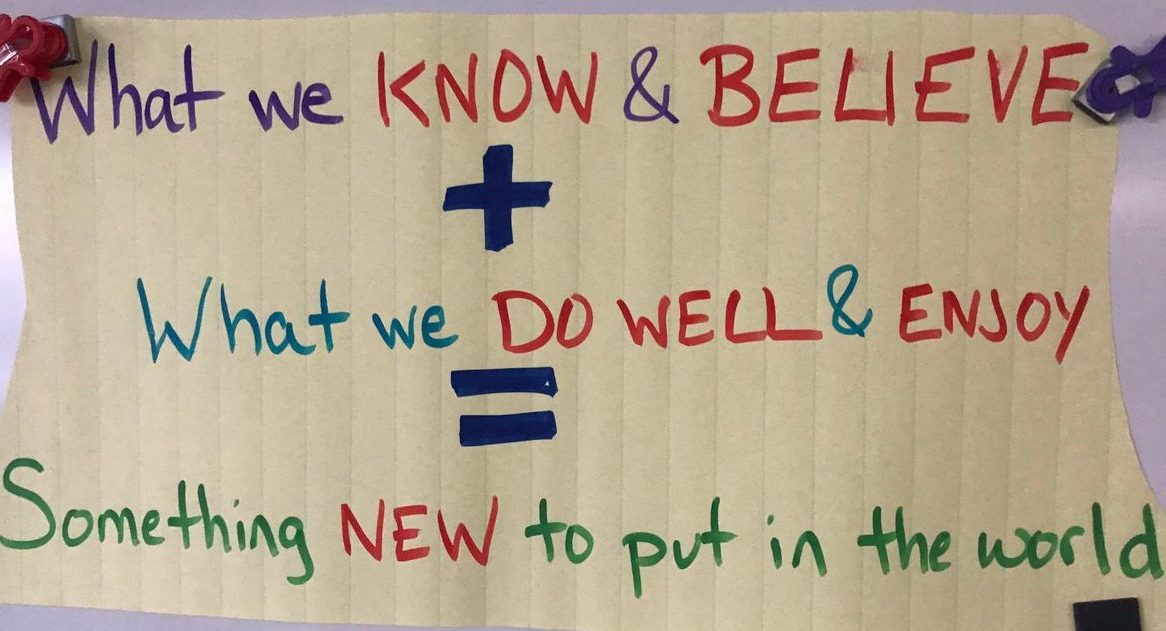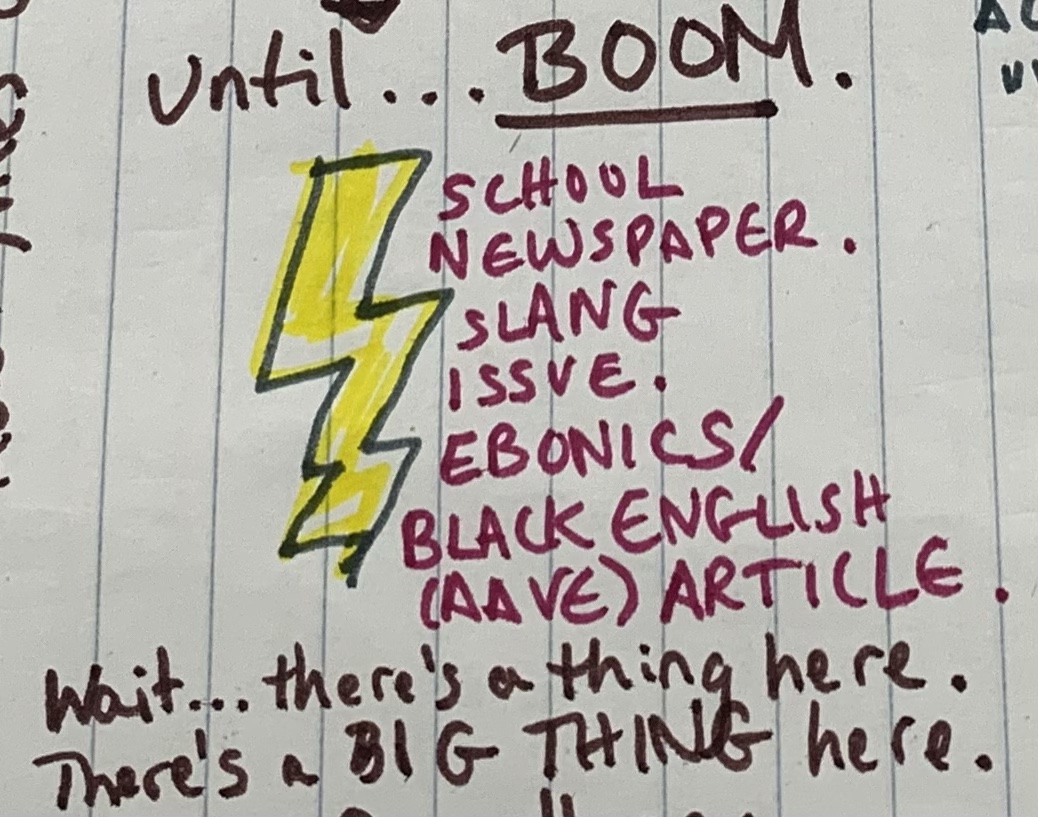Each Sunday, I’m working my way through my experiences with race. I’ll share stories and memories from throughout my life. I know I’ll encounter moments of growth that I wish I could relive. I’ll also have to think back on choices that I wish I could remake. Today also marks Day 14 of the Slice of Life challenge. Join me as I work to write every day in March – and beyond!

Every story has a turning point. There is a moment of truth, a fulcrum on which our seesaw of experience forever rests between “before” and “after.” I’ve had several such moments in my life.
The details are sketchy. There’s a chance I have some of them wrong. There’s also much more complexity to this than I can express in a single blog post, but we all know words have their limitations at times. This is one of those times.
My first moment of racial reckoning occurred in high school. It was my junior or senior year. The high school newspaper just published an issue on slang. In it was an article on Black English.
I remember holding that edition of the paper in my hands, scrolling through the articles, and reading that one with some interest. I remember the article mentioning Black English Vernacular and giving some examples of its structure. I don’t remember much about the content of the article.
I do remember that it wasn’t written by someone Black.
And it didn’t sit well.
And it brought forth a lot of anger.
So much so that the local news covered our news.
LOTS of people were talking about it.
And if you asked me how things eventually turned out, I don’t even think I could tell you.
But I do remember that being a moment of truth for me. This idea I carried in my head, the one that told me racial justice and equality were “done” once Martin Luther King and Rosa Parks took care of things? It was a lie. There was still prejudice and racism and bias and inequality. There were wounds, still seething anger across and within racial groups, and it took a high school newspaper article to puncture that boil.
It was the first time I recognized there was still work to do. That I had work to do. That there was so very much I didn’t know, didn’t understand, hadn’t bothered to see.
That was the truth I had to sit with. That I still sit with. It has shaped me, has driven me. It’s what drove me to seek the experiences I have in college (starting up on that next week!) and beyond.
And…if you’re someone I know who remembers this time, I’d welcome your memories in the comments. I keep trying to put more perspective to these events, and I could use yours.


Powerful. The exercise of confronting our first memory of racial reckoning is necessary in order to grow. What we do with the realization is critical. Thank you for sharing. This imagery is spot on- “There were wounds, still seething anger across and within racial groups, and it took a high school newspaper article to puncture that boil.”
Thank you! And yes – it’s not just the realization and the learning, but the DOING that ensues.
Thanks. Yes, reckoning is necessary. I’m also thinking about some of the upcoming moments I’ll need to write about. THOSE are going to be some tough ones…
We all have a turning point in out lives. I believe that where we live plays into when we reach that point. As a child I lived in a strictly white community consisting of a variety of ethnic backgrounds but no people of color. Even my teachers through all 12 years were white. The only exposure I had to people of color was my yearly trips to NYC and what I saw on the sitcoms I watched. We all know how accurately they depicted life.
Absolutely – where we live and HOW we live plays an important part. As for media depictions…yeah. TOTALLY accurate ; )
Recently I’ve had conversations with other people who look like me, and they’ve said, “I don’t see what the big deal is.” My response to that has been, “Do you really not see, or are you just saying that? Can you accept that there’s something you might not understand?” I think on that often, how there is so much that’s beyond my experience and ability to understand, and I try to respect that. Respecting difference is hard, but the need is real. Moving beyond simple respect and embracing others is even harder. Thank you for sharing this part of your life, Lainie.
I wonder what resistance or fear is behind that reluctance. What is it that people are sacrificing to see things another way? I guess that’s why we need to keep talking, and LISTENING.
This is way bigger than a single thought, but I believe it comes down to fear. The fear that if one changed his or her position it will somehow diminish them. It’s simply not worth the risk, which is so sad.
You are doing some good, hard work here. Language is a very emotional issue and one where we have been ignorant. Thank you for this honest reflection and I will consider taking up your invitation.
Thank you! I’m glad to know there’s something about my work that you identified with.
Thank you for writing about your first experience with noticing racism. I appreciated how you processed the experience through your writing. It let the reader think with you and have some accountability. We all have to think about what we would do and what we will do moving forward.
Thank you! Yes, this WAS the first time I internalized the notion that our work wasn’t done, and that I saw the effects that racism had on people around me who I cared about. And you’re right – it’s what we DO with our knowledge that counts.
Reckoning. It’s not something that’s easy to sell or to convince folks to join in. Reckoning is hard and we know that in advance which explains why so many of us shy away. I so appreciate the way you are sharing your experiences to help demystify the process. By locating the stories and actions, you arrive at the data that informs how you got to today’s version of yourself. Thank you, Lainie!
Thanks – although I have the feeling that by the time I get to the present, the version of myself I am now will be different yet again – guess that’s what evolution is for. And yes, reckoning involves a long, tough look at our reality. I forget that there are others who, for whatever reason, choose not to engage. I can always hold out hope they’ll find ways and moments to grow.
Such an amazing practice to reflect on a racial reckoning from the past! I’m sure it’s hard to not only remember, but to process it and think about it now. Thank you for sharing this!
Thanks! Hopefully as they read, folks find something that resonates or gives them food for thought.
I think it’s great how you’re working your way through your experiences with race. In 5th grade, I first became aware of segregation. I had a wonderful teacher who was black, the only black teacher in the school. My parents were wondering which town she could live in, and they said she must live in this one particular town. I had no idea what they meant. And it was only then that I realized that we didn’t have people of color in my neighborhood. We lived apart.I hadn’t seen it before.
Another tale… I facilitated a race inquiry group in my school and the day after Obama won in 2008, a white teacher came up to me and said we could disband the group now, now that we were living in a post-racial world. (There is still lots of work to be done.) Thanks for your post.
Ah yes. The Obama factor. Guessing there’s a whole new generation of folks who think we’re “done.” As for the teacher you had when you were younger, I hear you. I had a friend who told me the suburb we grew up in, which even had its share of black and brown faces, was actually a sundown town: folks from north of a certain road weren’t allowed to be south of it after a certain time. So yes, many of us lived apart – by design…
So powerful. I remember my first brush with racism/hate too. It was a coming-of-age moment.
One we never forget…
Wow! This well-crafted slice was thought-provoking. Your line, “it took our high school newspaper to puncture that boil” really got me. I’ll look forward to reading more and I’ll also be thinking of my own awareness of racism. Thank you.
Thank you! I’m glad my words resonated with you. It’s all we can hope for as writers!
I am remembering many friends in elementary school who didn’t look like me; we played together every day and stuck up for one another. I remember their first and last names; I can see their faces to this day. Yet around this same time a member of the extended family caused a scandal by having an interracial relationship. It was hard to understand, as I loved my friends… I quickly learned that asking questions was frowned upon. Just think of all the potential dangers to little developing mindsets…thank you for your courage, Lainie.
Thanks, Fran. There’s a lot about this that doesn’t feel so very courageous. More like…I’m trying to work out and think through a bunch of stuff, and I’m grateful for everyone who’s willing to come along for the exploration. As for your experience, the question of interracial relationships was still taboo around me when I was growing up. Oh. We have so much to learn…
Still so much to learn, yet, we have come a long way… “a journey of a thousand miles begins”…
Hi there – I’m glad I circled back around to see your Sunday post because I’m definitely thinking a lot about the same kinds of things… I actually wrote a long piece about it but am still adding to it so it’s too much to share here but I will eventually. Thanks for your perspective – as you said, it does help. Looking forward to continuing the conversation.
Thank you! Actually, you pinpointed the exact reason why I’m making it a Sunday series. I have WAY too much to share in a single blog post. Glad you could join me!